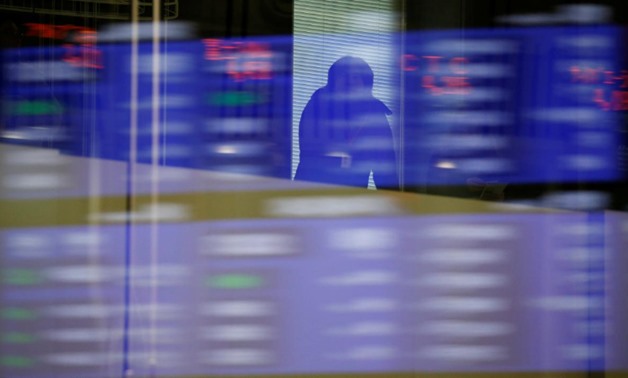
A visitor is seen as market prices are reflected in a glass window at the Tokyo Stock Exchange (TSE) in Tokyo, Japan, February 6, 2018. REUTERS/Toru Hanai
TOKYO - 8 February 2018: Asian shares flirted with six-week lows on Thursday as U.S. bond yields crept up towards four-year highs as investors fretted that low borrowing costs enjoyed by companies for many years may be endangered by the threat of rising inflation.
U.S. congressional leaders reached a two-year budget deal to raise government spending by almost $300 billion, a rare display of bipartisanship that should stave off a government shutdown but also widen the federal deficit sharply.
“The scale of increase in spending was much larger than what markets were expecting just a few months ago. It will have as big impacts as tax cuts. Since the markets haven’t priced this in yet, U.S. bonds could be sold for another week or so,” said Tomoaki Shishido, fixed income analyst at Nomura Securities.
Combined with an expected economic boost from President Donald Trump’s planned tax cuts, the increased deficit spending could overheat already strong U.S. growth and accelerate inflation to levels not seen over a decade.
Such fears drove the 10-year U.S. Treasuries yield back up to 2.813 percent, near Monday’s four-year peak of 2.885 percent.
The Senate and the House were both expected to vote on the proposed deal on Thursday, amid some opposition on both sides of the aisle.
Share markets remained on edge after a big selloff in equities in the past few days on worries about the prospects of rising interest rates around the world, which would shut off the liquidity spigot that has underpinned an exuberant rally in riskier asset.
MSCI’s broadest index of Asia-Pacific shares outside Japan was little changed, staying near its six-week low touched on Tuesday.
Japan’s Nikkei gained 0.4 percent, though it was still down more than six percent so far this week.
MSCI’s broadest gauge of the world’s stock markets has lost ground in seven of the last eight sessions until Wednesday, a period in which it slumped 6.8 percent.
U.S. stocks ran out of steam on Wednesday after an early surge, with the S&P 500 ending down 0.50 percent and the Nasdaq Composite losing 0.9 percent.
The Cboe Volatility Index, known as the VIX and often seen as investors’ fear gauge, fell 2.3 points to 27.73, but that was still more than twice the levels generally seen in the past few months.
Andrew Milligan, Head of Global Strategy at Aberdeen Standard Investments, said in a note it was not a surprise to see a market correction after a long period of low volatility
“This (low volatility) was aided by central bank QE policies continuing to inject sizeable amounts of liquidity into a wide range of financial assets, as well as the steady state of the global economy continuing to reassure investors,” he said.
“All in all, the probability of a correction has increased over time, which creates a good opportunity for active investors, as long as long-term drivers remain positive.”
China’s trade data showed the country’s exports and imports beat market expectations in January, rising 11.1 percent and 36.9 percent from a year earlier respectively, underscoring the strength of the global economy.
The dollar was supported after the budget deal in Washington, rising against a broad range of currencies.
The dollar index rose to a two-week high of 90.403 on Wednesday and last stood at 90.251.
The euro dipped to $1.2276, staying near its lowest level in two weeks.
Southern European government bond yields tumbled on Wednesday, after Germany’s pro-European, pro-spending Social Democratic party took the finance ministry in a coalition government.
The dollar stood at 109.35 yen, recovering from Wednesday’s low of 108.92.
The New Zealand dollar fell to four-week lows after New Zealand’s central bank lowered its forecasts for inflation right out to 2020 while saying volatility in equity markets this week was a warning sign that global investors are nervous about the risk of higher inflation and rising interest rates.
The kiwi fell to $0.7190, a low last seen on Jan. 11.
Precious metals also dipped, with gold hitting a four-week low of $1,311.6.
Oil prices fell after U.S. data showed a build in inventories and record high crude production, raising worries of more selling.
Brent crude futures tumbled to a six-week low of $65.16 $ per barrel.
U.S. crude futures hit one-month low of $61.25 per barrel and last traded at $61.65.


Comments
Leave a Comment